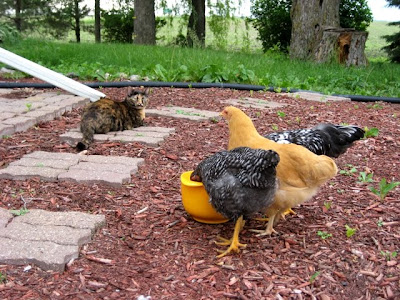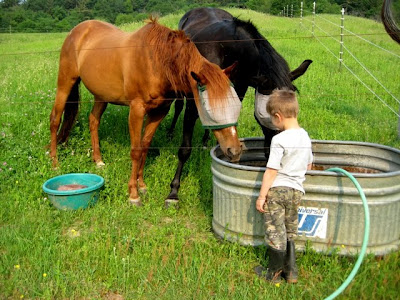First, I want to apologize for the delay in writing this post. For those of you who've been following this blog for awhile (and you two know who you are), you're probably wondering if Boo and Monet are still in full fleece after Papa Bear blew his knee out as we were preparing to
shear Honeywiese back on May 17th.
A week after this unfortunate incident, PB had knee surgery to repair the torn meniscus that was causing him so much pain (and inability to bear weight). Two and a half weeks of recovering later, and after a bizarre but thankfully short-lived heatwave that we spent hosing off the boys at regular intervals and worrying that they might die of heat stroke before we could shear them, we decided to take another run at this whole shearing thing.
PB still could not bend or kneel with his bad knee, but he felt he was now strong enough to work around this obstacle. We wanted to shear early in the morning to avoid too much heat stress on the boys (and us!) and the only time we could get three of us together at the same time was the Sunday morning before I left for the
Big Farm, on June 5th.
{Just a note of interest - most farms usually have
many pairs of hands for shearing day. I recently helped out at a farm that had almost as many people helping as there were alpacas - close to two dozen! However, we felt with only 2 animals to shear, we could do this effectively with just the three of us.}
Saturday night we locked the boys in the barn with their water but no food. We had read on many sheep and alpaca sites that it's best to shear them when their stomach is empty - it's more comfortable for them, when they're stretched out in the ropes, and also provides less ammunition for spitting or leaking out the other end (some spit, some scream, some pee, some poo, some do all of this at the same time). We could have taken them off their water also if it had not been so hot.
Sunday dawned beautiful and sunny. We moved the ATV (which we would use as an anchor point for one side of the leg ropes), stretched out the tarp, attached the ropes to a fence post and the ATV hitch, got the shears donned with a new comb and cutter, and were ready for our first
victim client by 9:00am.
We decided to break PB in by re-shearing Honeywiese first. If you read about our
first attempt, you'll know the shears were not working correctly (we deduced later, being they were the ones shipped on the new unit, they might have dulled in the shipping process) and my having only shorn one animal before, Honeywiese's cut was shall we say, not as handsome as we thought he deserved.
So even though he's our biggest animal, probably close to 200 pounds, and PB's knee was tenuous, we thought it best to re-shear him first. Aside from the awkward moment of putting the leg loops on the ankles and then pulling the ropes until the animal goes down, never a fun time for animal or human, the rest of the shearing went surprisingly well. In no time at all, he was all cleaned up and back on his feet.
I think I let out a big sigh of relief at this point. I worried that the un-sedated version of Honeywiese would be a circus. But in fact, it was no big deal at all. The rest should be easy.
Next up was Boo (we were shearing coarsest animal to finest, so that by the time PB was back in the swing of things, he'd be shearing our nicest fleece last - and, hopefully, best). He was very little effort to get over to the shearing area and put in the leg ropes. The fun began after he was on the ground.
I've assisted alpaca shearers for four years now, and I've never seen an animal fight with his head as much as this little guy. He's probably only 125 pounds full grown, not a very large alpaca, and very sweet and submissive. But holy moly that boy can move his head around! C-baby and I switched places halfway through the shearing because he was wearing her out - and then he wore me out, too! He also screamed a bit and drooled spit. That doesn't bother me. But trying to hold his head still so he wouldn't get cut was the worrisome part.
It was also getting hot out, and I was worried he was going to get heat stress with how much he was straining. We finished him off and watched him try to get up and go back to the pasture. He seemed to be worn out from the whole ordeal. The rest of the day he sort of hung out by himself (very rare for an alpaca), laying low and just recovering his strength. I was worried he might have strained his neck, but by the next day he was just fine again.
Since I wasn't expecting such a struggle from that little guy, I was wondering how Monet would do. I needn't have worried. He was an angel. First off, we moved the tarp to the shade, since the sun was pretty high and hot by now. So we were all more comfortable. But secondly, I barely had to hold his head at all. He lay perfectly still the entire time. C-baby ogled his gorgeous, soft fleece as it came off and she collected it all in a bag. I just love this little guy's fleece. Last year we tested him and his AFD was 16 micron. In comparison, a human hair is about 70 microns! Angora goats need wool 18 microns or less to be labeled cashmere. So our little guy was finer than cashmere last year.
All-in-all, it was a very successful, low-stress morning, albeit physically demanding. After all of that, I worked on weeding and mixing up potting soil for my garden beds, then jumped in my car and drove 4 hours to the
Big Farm, where I've been spending four days/week learning how to tend all kinds of animals - alpacas, horses, cows and 150 baby chickens. In my "free time" I've been driving all over Monroe and Vernon counties looking at properties for sale.
To say I've been busy would be an understatement. But then, when isn't a Farmgirl busy?
I wouldn't have it any other way!























































